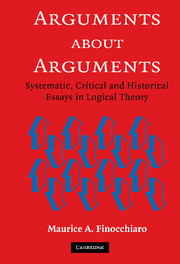Book contents
- Frontmatter
- Contents
- Preface and Acknowledgments
- Introduction : An Approach to a Branch of Logic
- Theorizing about reasoning and argument
- Fallacies and asymmetries
- Critiques
- 10 Siegel on Critical Thinking : Reasoning versus Rationality versus Criticism (1989)
- 11 Induction and Intuition in the Normative Study of Reasoning : Cohen on Inductive Reasoning in Philosophy (1991)
- 12 Logic, Politics, and Gramsci
- 13 The Dialectical Approach to Interpretation and Evaluation : From Axiom to Dialogue (Barth) and from Structure to Dialogue (Freeman) (1995)
- 14 The Port-Royal Logic's Theory of Argument
- 15 A Critique of the Dialectical Approach, Part Ⅱ : The Amsterdam School and Walton on Complex Dialogues (1999)
- 16 Valid Ad Hominem Arguments in Philosophy
- 17 Dialectics, Evaluation, and Argument : Goldman and Johnson on the Concept of Argument (2003)
- Historical analyses
- Selected Bibliography
- Index
17 - Dialectics, Evaluation, and Argument : Goldman and Johnson on the Concept of Argument (2003)
from Critiques
Published online by Cambridge University Press: 05 February 2015
- Frontmatter
- Contents
- Preface and Acknowledgments
- Introduction : An Approach to a Branch of Logic
- Theorizing about reasoning and argument
- Fallacies and asymmetries
- Critiques
- 10 Siegel on Critical Thinking : Reasoning versus Rationality versus Criticism (1989)
- 11 Induction and Intuition in the Normative Study of Reasoning : Cohen on Inductive Reasoning in Philosophy (1991)
- 12 Logic, Politics, and Gramsci
- 13 The Dialectical Approach to Interpretation and Evaluation : From Axiom to Dialogue (Barth) and from Structure to Dialogue (Freeman) (1995)
- 14 The Port-Royal Logic's Theory of Argument
- 15 A Critique of the Dialectical Approach, Part Ⅱ : The Amsterdam School and Walton on Complex Dialogues (1999)
- 16 Valid Ad Hominem Arguments in Philosophy
- 17 Dialectics, Evaluation, and Argument : Goldman and Johnson on the Concept of Argument (2003)
- Historical analyses
- Selected Bibliography
- Index
Summary
Introduction: Critique of the Dialogue Model
For several years I have been exploring the nature of the dialectical approach to argument, its relationship to other approaches, its methodological fruitfulness, and its limitations. Although the precise meaning of the dialectical approach is part of the problem, I can say immediately that I mean it in the sense in which it is distinguished from monological or monolectical approaches, and not in the sense it is distinguished from logical and rhetorical approaches; for these two distinctions crisscross each other, as is obvious from the work of many scholars that is both dialectical and logical (Barth and Krabbe 1982; Blair and Johnson 1987; Woods and Walton 1989). My main motivation stems from the fact that the dialectical approach has become the dominant one in argumentation theory. Now, whenever any approach in any field becomes dominant, there is always the danger that it will lead to the neglect or loss of insights which are easily discernible from other orientations; this in turn may even prevent the dominant approach from being developed to its fullest as a result of the competition with other approaches.
Let us begin with a review of some background results from the relevant literature. One of the best examples of the dialectical approach is a work entitled From Axiom to Dialogue by Else Barth and Erik Krabbe (1982; cf. Barth and Martens 1982).
- Type
- Chapter
- Information
- Arguments about ArgumentsSystematic, Critical, and Historical Essays In Logical Theory, pp. 292 - 326Publisher: Cambridge University PressPrint publication year: 2005
- 1
- Cited by



